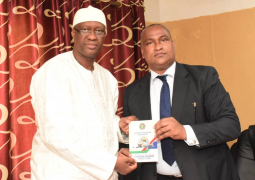The GMB EU is an annual publication that provides an update on both economic developments and the development challenges facing The Gambia.
However, the report further states that the economic growth will be muted due to the impact of the war in Ukraine on commodity prices and terms-of-trade over the medium term. It continued that the growth assumes political stability, a renewed focus on policy implementation, and normal weather conditions.
On the demand side, it explained that growth is forecast to be driven by a sustained increase in private consumption and public infrastructure investment, adding the negative effects of the pandemic-induced supply chain disruptions may still be felt and with only 13.2% of the population fully vaccinated, the economy could be vulnerable to new COVID-19 variants. The report further says this could be compounded by further supply chain disruptions, and rising basic food, energy, and fertiliser prices because of the war.
"The economy is expected to grow as the pandemic recedes and vital sectors recover, driven by the return of tourism, continued foreign inflows, and large infrastructure investments. However, the outlook is dampened by the global contagion of the ongoing Russia-Ukraine conflict. Although its direct investment, tourism, and trade links with Russia and Ukraine are limited, The Gambia is a net importer of food, fertilizer, and fuel. The conflict is expected to drive up the cost of these imports and increase inflation."
"Real GDP growth is projected to reach 5.6% in 2022 (2.7% in per capita terms), compared to the pre-war forecast of 6.2%. The services sector is projected to grow by 7.2% in 2022. Agriculture should grow by 2.0% in 2022, assuming favorable weather, and industrial output by 4.9% in 2022. On the demand side, remittances are expected to continue supporting private consumption and investment in construction and improve the external position."
The report further states that the current account deficit, including grants, is forecast to widen to 12.3% of GDP in 2022. It continued that this increase reflects slower growth in service exports driven by slowly recovering tourism receipts, compared to pre-pandemic rates, while consumption and investment-related imports grow and the price of wheat and oil are expected to increase.
"Supply disruptions are also expected to widen the merchandise trade deficit. Remittances are projected to stabilise as the record-high growth seen in the past two years is not expected to continue. Over the medium term, the current account deficit is projected to stay high, reflecting import-intensive public investment projects. However, exports will grow, supported by a rebound in tourism, albeit gradual, and revitalized re-exports. The deficit will largely be enhanced by FDI and capital transfers. Foreign exchange reserves are projected to hover at over 4 months of imports."





